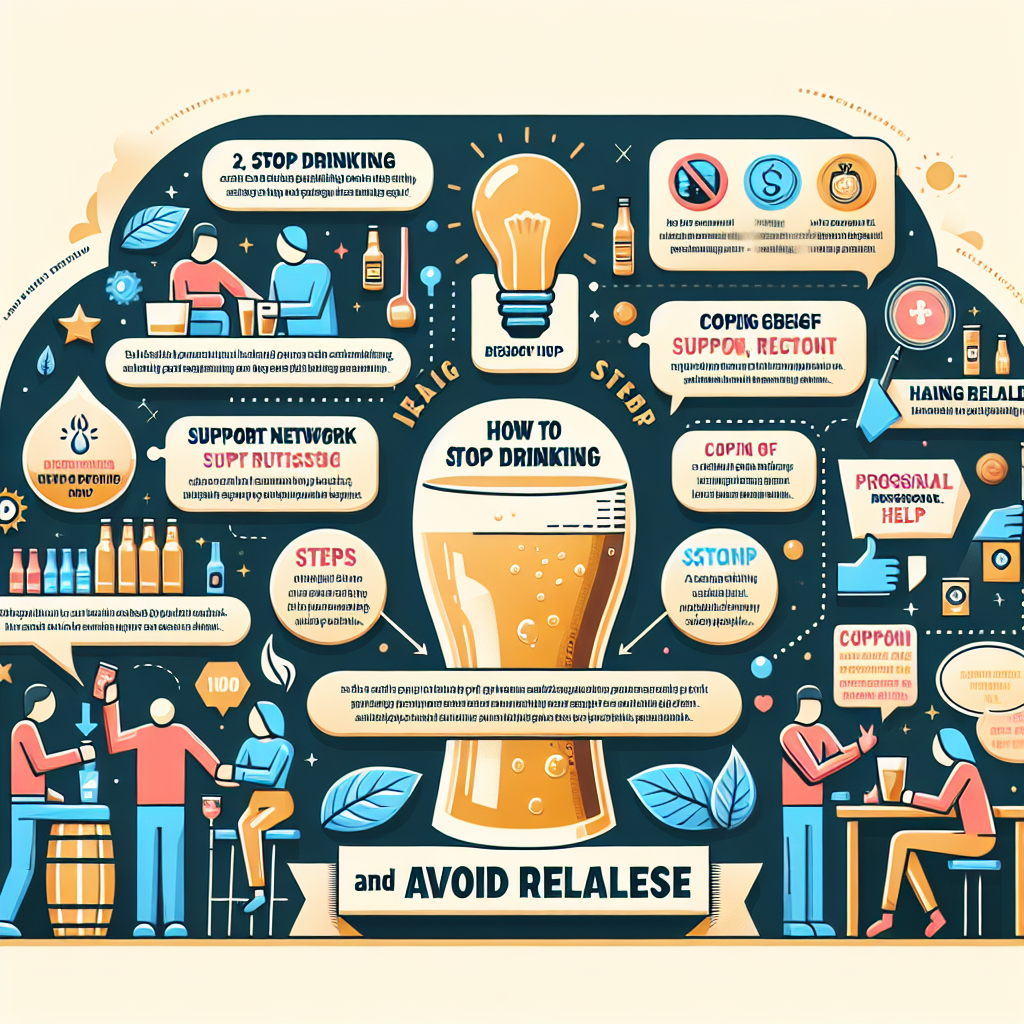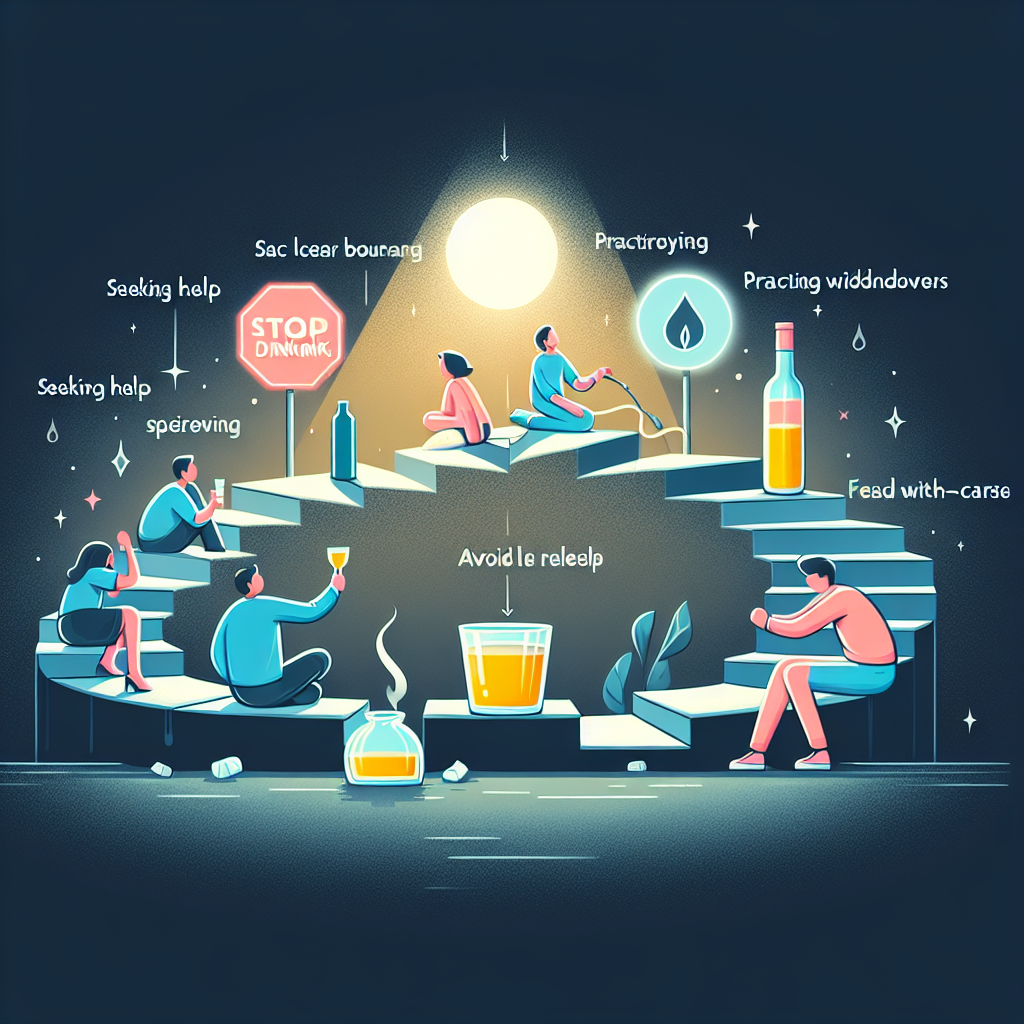-
Table of Contents

“Empower Your Journey: Break Free from Alcohol and Embrace Lasting Sobriety”
Introduction
Stopping drinking and avoiding relapse is a challenging but achievable goal that requires a multifaceted approach. It begins with acknowledging the problem and making a firm commitment to change. The process involves understanding the triggers and underlying causes of alcohol dependence, seeking professional help, and building a strong support system. Developing healthy coping mechanisms, engaging in regular physical activity, and adopting a balanced diet are crucial steps in maintaining sobriety. Additionally, participating in support groups and therapy can provide ongoing encouragement and accountability. By implementing these strategies and remaining vigilant, individuals can successfully overcome alcohol addiction and sustain long-term recovery.
Strategies To Stop Drinking And Maintain Sobriety
Deciding to stop drinking is a courageous and transformative step towards a healthier and more fulfilling life. However, the journey to sobriety is often fraught with challenges, and maintaining it requires a combination of strategies, support, and self-awareness. To begin with, setting clear and realistic goals is essential. Rather than aiming for immediate and complete abstinence, it can be more effective to set incremental milestones. This approach not only makes the process less overwhelming but also allows for the celebration of small victories, which can be incredibly motivating.
In addition to goal-setting, seeking professional help can provide a solid foundation for your journey. Therapists, counselors, and support groups such as Alcoholics Anonymous offer invaluable resources and a sense of community. These professionals and peers can provide guidance, share experiences, and offer emotional support, which is crucial in moments of doubt or temptation. Moreover, they can help you develop coping mechanisms to deal with triggers and stressors that might lead to relapse.
Another critical strategy is to create a supportive environment. This involves distancing yourself from people, places, and activities that encourage drinking. Instead, surround yourself with individuals who respect your decision and support your sobriety. Engaging in new hobbies and activities can also be beneficial. By filling your time with positive and fulfilling pursuits, you reduce the likelihood of turning to alcohol out of boredom or habit. Exercise, for instance, is a powerful tool in maintaining sobriety. It not only improves physical health but also boosts mental well-being by releasing endorphins, which can help reduce cravings and improve mood.
Furthermore, mindfulness and stress management techniques play a significant role in maintaining sobriety. Practices such as meditation, yoga, and deep-breathing exercises can help you stay grounded and manage stress without resorting to alcohol. These techniques enhance self-awareness, allowing you to recognize and address negative emotions before they lead to relapse. Additionally, maintaining a balanced diet and getting adequate sleep are fundamental aspects of self-care that support overall well-being and reduce the risk of relapse.
It is also important to acknowledge and address any underlying issues that may have contributed to your drinking. This could include mental health conditions such as depression or anxiety, unresolved trauma, or relationship problems. By working through these issues with a professional, you can develop healthier coping mechanisms and reduce the likelihood of turning to alcohol as a form of self-medication.
Moreover, having a relapse prevention plan in place is crucial. This plan should include strategies for dealing with high-risk situations, a list of people to call for support, and reminders of the reasons you chose sobriety. It is also helpful to regularly review and update this plan as you progress in your journey. Remember, relapse is not a sign of failure but rather an opportunity to learn and strengthen your commitment to sobriety.
Lastly, practicing gratitude and self-compassion can significantly impact your journey. Celebrate your progress, no matter how small, and be kind to yourself during setbacks. Sobriety is a continuous process, and each day without alcohol is a testament to your strength and resilience. By employing these strategies and maintaining a positive and proactive mindset, you can successfully stop drinking and build a life of lasting sobriety.
Effective Techniques To Prevent Alcohol Relapse
Overcoming alcohol addiction is a monumental achievement, but maintaining sobriety can be an ongoing challenge. To prevent relapse, it is essential to employ effective techniques that not only help you stay on track but also empower you to lead a fulfilling life without alcohol. One of the most crucial steps in avoiding relapse is to develop a strong support system. Surrounding yourself with people who understand your journey and encourage your sobriety can make a significant difference. This support can come from family, friends, or support groups such as Alcoholics Anonymous. Engaging with others who share similar experiences can provide a sense of community and accountability, which are vital in maintaining long-term sobriety.
In addition to building a support network, it is important to identify and avoid triggers that may lead to relapse. Triggers can be people, places, or situations that remind you of drinking or create a strong urge to drink. By recognizing these triggers, you can develop strategies to avoid or cope with them. For instance, if social gatherings where alcohol is present are a trigger, consider attending events where alcohol is not the focus or bringing a sober friend along for support. Moreover, learning to manage stress effectively is another key component in preventing relapse. Stress is a common trigger for many individuals, and finding healthy ways to cope with it can make a significant difference. Techniques such as mindfulness meditation, exercise, and deep-breathing exercises can help reduce stress and improve overall well-being.
Furthermore, setting realistic goals and celebrating small victories can help maintain motivation and prevent relapse. Recovery is a journey, and acknowledging your progress, no matter how small, can boost your confidence and reinforce your commitment to sobriety. Keeping a journal to track your achievements and reflect on your experiences can also be a valuable tool in this process. Another effective technique is to establish a routine that promotes a healthy lifestyle. Regular exercise, a balanced diet, and adequate sleep are essential components of physical and mental well-being. Engaging in activities that bring you joy and fulfillment, such as hobbies or volunteering, can also provide a sense of purpose and reduce the temptation to drink.
Additionally, seeking professional help when needed is crucial in preventing relapse. Therapists, counselors, and addiction specialists can provide valuable guidance and support tailored to your specific needs. Cognitive-behavioral therapy (CBT), for example, has been shown to be particularly effective in helping individuals develop coping strategies and change negative thought patterns related to alcohol use. Medication-assisted treatment (MAT) may also be an option for some individuals, as it can help reduce cravings and manage withdrawal symptoms.
Lastly, it is important to practice self-compassion and understand that setbacks are a natural part of the recovery process. If a relapse does occur, it does not mean that you have failed. Instead, view it as an opportunity to learn and grow. Reflect on what led to the relapse and develop a plan to address those factors moving forward. Remember that recovery is a lifelong journey, and each day is a new opportunity to make positive choices.
By implementing these effective techniques, you can build a strong foundation for lasting sobriety and lead a fulfilling life free from alcohol. Embrace the journey with determination and resilience, knowing that each step forward brings you closer to a healthier, happier future.
Q&A
1. **Question:** What are some effective strategies to stop drinking alcohol?
**Answer:** Effective strategies to stop drinking alcohol include seeking professional help through therapy or counseling, joining support groups like Alcoholics Anonymous (AA), setting clear and achievable goals, avoiding triggers and high-risk situations, and developing healthy coping mechanisms such as exercise, hobbies, and mindfulness practices.
2. **Question:** How can someone avoid relapse after quitting alcohol?
**Answer:** To avoid relapse after quitting alcohol, individuals can maintain regular attendance at support group meetings, continue therapy or counseling, build a strong support network of friends and family, practice stress management techniques, stay vigilant about recognizing and managing triggers, and create a structured daily routine to stay focused and engaged.
Conclusion
To stop drinking and avoid relapse, it is essential to develop a comprehensive plan that includes seeking professional help, building a strong support network, identifying and avoiding triggers, adopting healthy coping mechanisms, and maintaining a balanced lifestyle. Regularly attending support groups, such as Alcoholics Anonymous, and engaging in therapy can provide ongoing guidance and accountability. Additionally, setting clear goals, practicing self-care, and staying committed to personal growth are crucial for long-term sobriety.



